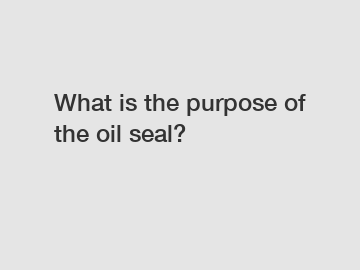Jan. 20, 2024
Automobiles & Motorcycles
With competitive price and timely delivery, SBT sincerely hope to be your supplier and partner.
What is the purpose of the oil seal?
The purpose of the oil seal is to prevent the leakage of lubricants and to keep out contaminants, such as dirt, dust, and moisture, in order to maintain the proper functioning and longevity of machinery and equipment. Oil seals are commonly used in various industries, including automotive, manufacturing, and engineering, where rotating or reciprocating components require effective sealing.

Oil seals are designed to fit tightly around rotating shafts or cylinder walls, creating a barrier that prevents the lubricants from escaping. They are typically made of rubber or elastomeric materials, which provide flexibility and resilience to withstand the dynamic movements and vibrations of the machinery. The sealing lip of the oil seal ensures a tight seal with the shaft or cylinder, utilizing the lubricant's viscosity to create a hydrodynamic effect that enhances sealing efficiency.
The necessity of oil seals arises from the fact that lubricants play a crucial role in reducing friction, heat generation, and wear within mechanical systems. These lubricants flow between the moving parts, providing a protective layer that minimizes the direct contact and frictional forces. However, without proper sealing, these lubricants can leak out, leading to inadequate lubrication and potential damage to the machinery.
The sealing efficiency of oil seals is critically important for the performance and reliability of machinery. When contaminants, such as dirt or moisture, infiltrate the system, they can mix with the lubricants, causing abrasive wear and corrosion on the components. This not only reduces the efficiency and lifespan of the machinery but also increases the maintenance and repair costs.
To ensure the effectiveness of oil seals, manufacturers employ advanced materials and engineering techniques. The design and specifications of oil seals are tailored to meet the specific requirements of different applications and operating conditions. Factors such as temperature, pressure, speed, and exposure to chemicals or harsh environments are taken into consideration to determine the appropriate material composition and seal geometry.
The development of efficient oil seal technology has significantly impacted various industries. Automotive engines, for instance, heavily rely on oil seals to prevent oil leakage and contamination. By maintaining a proper oil film, these seals contribute to the smooth operation of engine components, improving fuel efficiency and reducing emissions. In the manufacturing and engineering sectors, the use of reliable oil seals ensures the integrity of machinery and prevents costly downtime caused by component failures.
In conclusion, the purpose of the oil seal is to provide a reliable sealing barrier that prevents lubricant leakage and contaminants from entering machinery. The development of advanced oil seal technology has contributed to the efficiency, reliability, and longevity of mechanical systems across industries. By effectively sealing rotating or reciprocating components, oil seals play a crucial role in minimizing friction, heat generation, and wear, ultimately enhancing the performance and lifespan of machinery.
Contact us to discuss your requirements of Standard & Custom Oil Seals. Our experienced sales team can help you identify the options that best suit your needs.
Previous: Boost Your Off-Road Adventures with a Powerful 13000-lb Winch – Your Ultimate Guide!
Next: Revolutionizing the Future: Exploring China's Electrifying Sportbikes!
If you are interested in sending in a Guest Blogger Submission,welcome to write for us!
All Comments ( 0 )